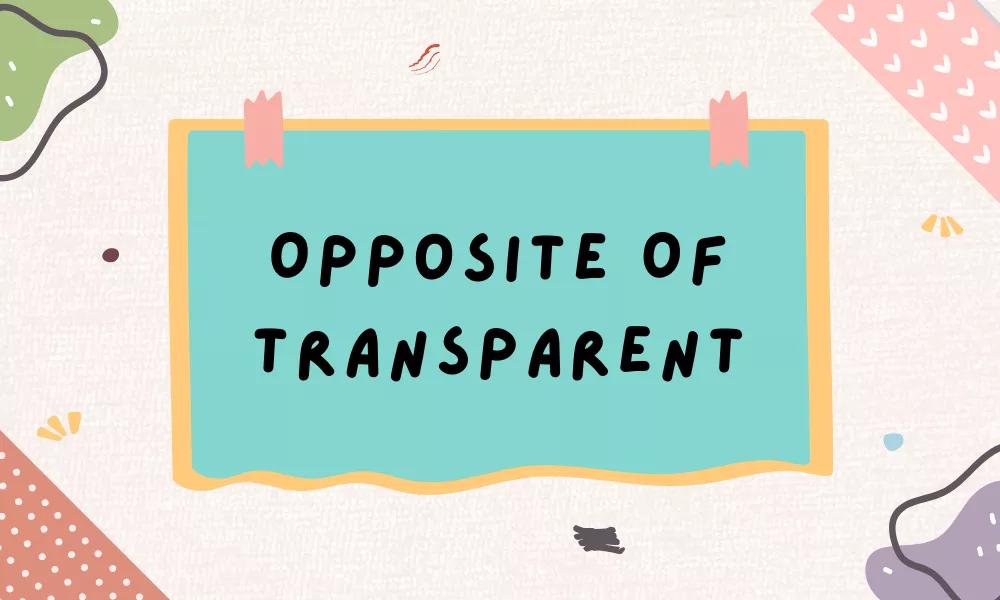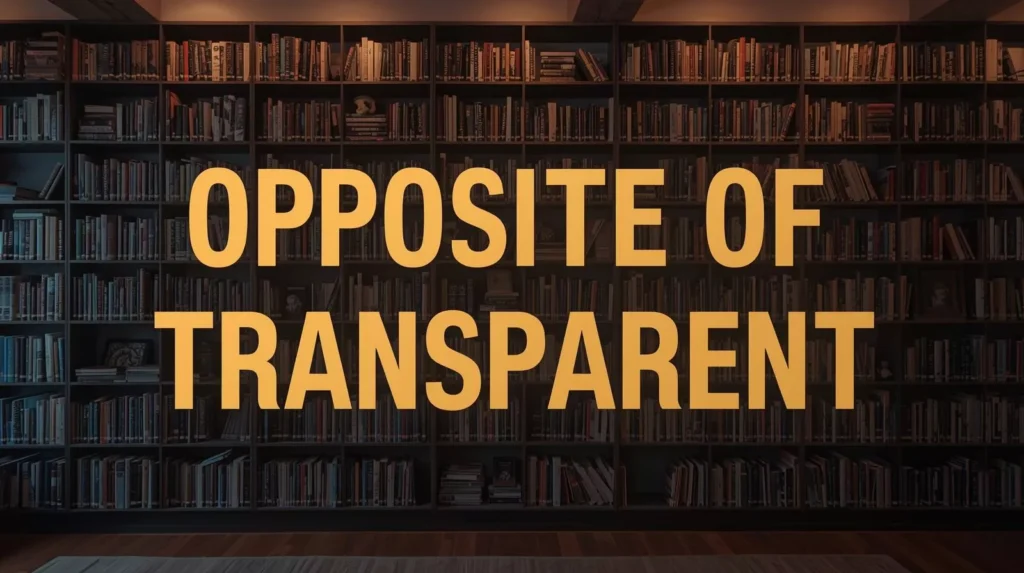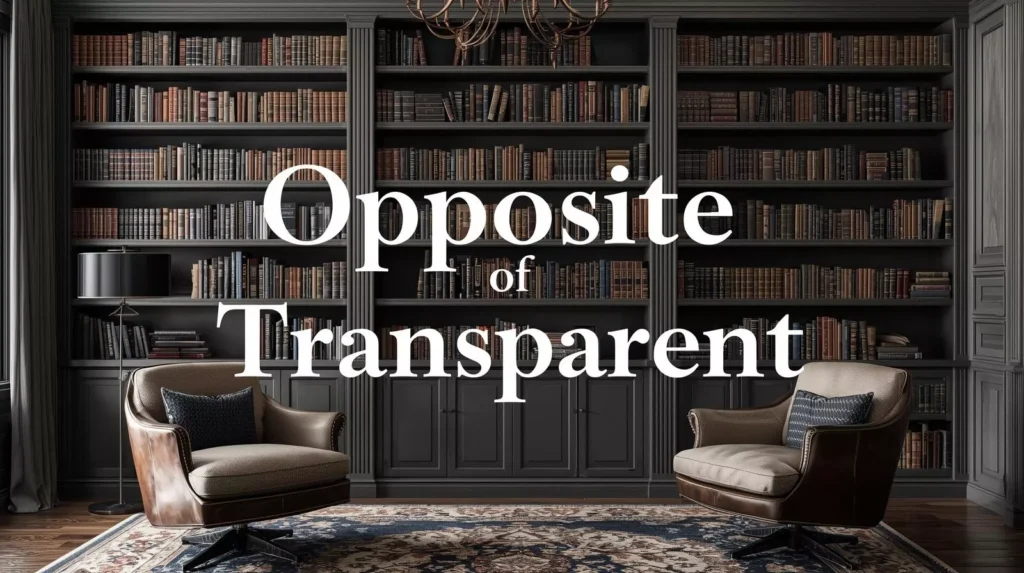Opposite of Transparent – Meaning, Antonyms, and Examples Explained

The word transparent is an adjective used to describe something clear, see-through, or easy to understand. When an object is transparent, light passes through it almost completely, allowing you to clearly see what’s on the other side. However, not everything in life or nature is transparent. The opposites of transparent such as opaque, cloudy, dark, hidden, or secretive, describe things that block light, obscure vision, or conceal truth. Whether referring to a physical object like frosted glass or an abstract idea like unclear intentions, these antonyms capture the essence of what it means to be unclear or concealed.
Meaning of Transparent
The word transparent means something that allows light to pass through clearly, so objects behind it can be easily seen. It’s often used to describe materials like glass or water that are clear and see-through. Beyond physical objects, transparent can also describe people, actions, or organizations that are open, honest, and easy to understand.

Why Knowing the Opposite of Transparent Matters
Understanding the opposites of transparent helps us describe situations, materials, or behaviors that are not clear or open. Words like opaque, cloudy, or secretive let us express when something blocks light, hides details, or lacks honesty. Knowing these antonyms improves your vocabulary and communication skills, allowing you to describe both physical appearances and emotional or moral qualities more precisely.
Antonyms of Transparent with Meaning And Example
- Opaque – Not allowing light to pass through; not transparent.
Example: The bathroom window is made of opaque glass for privacy. - Cloudy – Not clear or transparent; blurred or hazy.
Example: The water turned cloudy after the storm. - Murky – Dark and difficult to see through; unclear.
Example: Fish were hard to spot in the murky pond. - Foggy – Covered or filled with fog; unclear.
Example: The road was barely visible on the foggy morning. - Blurred – Lacking sharpness or definition; hard to distinguish.
Example: His blurred vision made it difficult to read the sign. - Dark – Having little or no light; difficult to see through.
Example: The dark glass made the car windows look mysterious. - Hidden – Concealed from view or knowledge.
Example: The true meaning of his words remained hidden. - Secretive – Inclined to hide thoughts or information.
Example: She became secretive about her plans. - Concealed – Kept out of sight; hidden.
Example: The treasure was concealed under the floorboards. - Obscure – Not clear or easily understood.
Example: The professor’s explanation was too obscure for beginners. - Impenetrable – Impossible to see through or understand.
Example: The thick fog was almost impenetrable. - Vague – Unclear or uncertain in meaning.
Example: His vague answers made her suspicious. - Ambiguous – Having more than one possible meaning; unclear.
Example: The contract language was ambiguous and confusing. - Shady – Slightly dark or suspicious in nature.
Example: The shady deal made everyone uncomfortable. - Covered – Not open to view; protected or hidden.
Example: The painting was covered with a sheet before the reveal.
Emotional Antonyms of Transparent
| Antonym | Meaning | Example |
|---|---|---|
| Dishonest | Not truthful or sincere. | His dishonest words broke her trust. |
| Deceptive | Misleading or giving a false impression. | The advertisement was deceptive about the product’s quality. |
| Secretive | Unwilling to share feelings or information. | She became secretive after the argument. |
| Guarded | Careful not to show feelings or thoughts openly. | He remained guarded during the conversation. |
| Reserved | Slow to reveal emotions or opinions. | She’s very reserved and rarely shares personal details. |
| Insincere | Not expressing genuine feelings. | His compliment sounded insincere. |
| Hidden | Not openly shown or expressed. | She kept her hidden sadness behind a smile. |
| Confusing | Not making emotions or intentions clear. | His mixed signals were confusing to everyone. |
| Ambivalent | Having mixed or unclear feelings. | She felt ambivalent about moving to a new city. |
| Manipulative | Controlling others through deceit or influence. | His manipulative behavior damaged their friendship. |
Behavioral Antonyms of Transparent
- Secretive – Hiding one’s actions or intentions.
Example: The company was secretive about its financial issues. - Sneaky – Acting in a sly or underhanded way.
Example: He took a sneaky look at the test paper. - Deceitful – Misleading others on purpose.
Example: A deceitful person cannot be trusted. - Cunning – Skilled in deceit or trickery.
Example: The cunning thief escaped without a trace. - Evasive – Avoiding direct answers or action.
Example: The politician gave evasive replies to tough questions. - Two-faced – Pretending to be friendly while being dishonest.
Example: She’s two-faced; kind in person but cruel behind your back. - Disguised – Altered in appearance or behavior to hide the truth.
Example: He attended the event disguised as a waiter. - Closed-off – Not open or communicative.
Example: After the scandal, the team became closed-off to reporters. - Ambiguous – Behaving in a way that’s unclear or open to interpretation.
Example: His ambiguous answers made everyone doubt his honesty. - Misleading – Causing someone to believe something untrue.
Example: The report was misleading and omitted key details.
Contextual Antonyms of Transparent
| Antonym | Meaning | Example |
|---|---|---|
| Opaque | In science or art, not allowing light to pass through. | The opaque surface blocked the sun completely. |
| Obscure | In communication, unclear or not well-known. | The author used obscure language that confused readers. |
| Confidential | In business, private or restricted information. | Employees must keep client data confidential. |
| Hidden | In context of truth or information, kept secret. | The hidden agenda behind the proposal was later exposed. |
| Covered | In physical sense, not open to view. | The window was covered with thick curtains. |
| Darkened | In lighting, not bright or illuminated. | The darkened room created a mysterious atmosphere. |
| Blurred | In vision or photography, not clear or sharp. | The blurred image made identification impossible. |
| Shadowy | In description, dim or vaguely defined. | They saw a shadowy figure move across the hallway. |
| Concealed | In investigation or speech, kept from being known. | The document contained concealed evidence. |
| Vague | In writing or speaking, lacking clarity. | Her vague statement left everyone uncertain about the plan. |
Read: Opposite of Salutation
Usage Rules for Antonyms of Transparent
- Match the Context – Use antonyms like opaque, cloudy, or dark for physical objects (like glass or water), and use secretive, hidden, or deceptive for emotional or behavioral contexts.
- Use Intensity Wisely – Choose stronger antonyms like impenetrable or concealed when describing complete lack of clarity, and softer ones like cloudy or vague for partial obscurity.
- Be Careful with Tone and Formality – Words like deceptive or two-faced carry negative connotations, while obscure or blurred are more neutral and academic. Match tone to your audience.
- Pair with Correct Nouns – Certain antonyms fit specific nouns: opaque glass, secretive person, vague idea, confidential report. Using the wrong pair can sound unnatural.
- Differentiate Between Visibility and Clarity – Use opaque, cloudy, or blurred for visual clarity; use vague, hidden, or confidential for informational or emotional clarity.

Common Mistakes When Using Antonyms of Transparent
- Using Physical Antonyms for Abstract Ideas – Saying “opaque person” or “cloudy behavior” sounds awkward. Use emotional or behavioral antonyms like guarded or secretive instead.
- Confusing Obscure with Obscene – Many learners mistake these words, obscure means unclear or hidden, while obscene means offensive.
- Overusing Negative Emotional Terms – Words like deceitful and manipulative are strong, avoid them in neutral contexts.
- Mixing Up Vague and Ambiguous – Vague means lacking detail; ambiguous means having multiple meanings. Use correctly depending on context.
- Ignoring Context of Honesty vs. Clarity – Transparent can mean “clear” or “honest.” Choose antonyms accordingly: opaque (for clarity) or deceptive (for honesty).
Antonyms of Transparent Quiz
Q1. The window was so _______ that no light could pass through.
A) Clear
B) Opaque
C) Shiny
D) Clean
Q2. Her motives seemed _______; nobody could tell what she was planning.
A) Honest
B) Hidden
C) Clear
D) Open
Q3. The teacher’s explanation was too _______ to understand easily.
A) Simple
B) Straightforward
C) Obscure
D) Honest
Q4. The company became more _______ about its financial problems after the audit.
A) Open
B) Secretive
C) Honest
D) Transparent
Q5. The lake water turned _______ after the heavy rain.
A) Cloudy
B) Clear
C) Transparent
D) Polished
Q6. His _______ answers made everyone suspicious of his real intentions.
A) Straightforward
B) Vague
C) Honest
D) Clear
Q7. The politician gave _______ replies to avoid revealing the truth.
A) Evasive
B) Direct
C) Transparent
D) Open
Q8. The glass door was _______ to keep the meeting room private.
A) Opaque
B) Clear
C) Bright
D) Glossy
Q9. His _______ behavior made it difficult to trust him again.
A) Honest
B) Deceptive
C) Sincere
D) Clear
Q10. The photo came out _______ and hard to recognize.
A) Bright
B) Blurred
C) Focused
D) Sharp
Answer: b,b,c,b,a,b,b,a,a,b
Read: Opposite of Challenge
Read: Opposite of Perspective
FAQs
Conclusion
The word transparent describes clarity, honesty, and openness, whether in physical objects like glass or in human behavior. Its antonyms, such as opaque, cloudy, secretive, and vague, represent the opposite. Understanding the opposites of transparent helps you communicate more precisely and effectively in both daily life and writing. Whether you’re describing a foggy window or someone’s unclear intentions, using the right antonym adds depth and accuracy to your expression.
